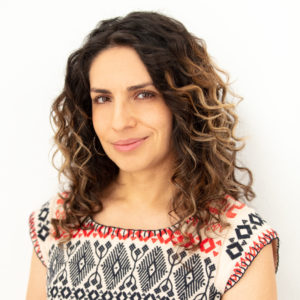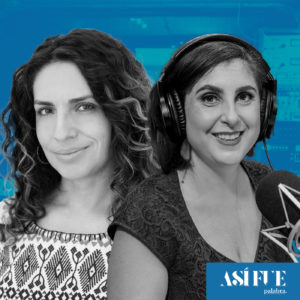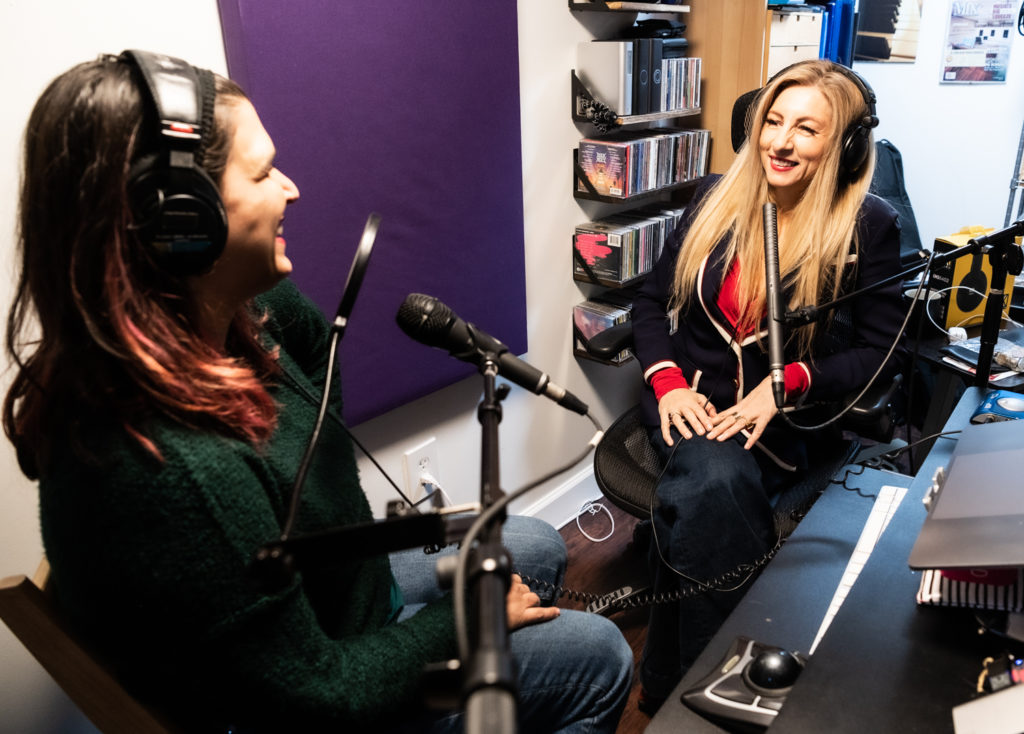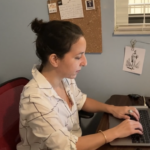The stories of journalists who cover the U.S.-Mexico border and a wide range of migration experiences are the focus of Así Fue, a podcast by palabra, an initiative of the National Association of Hispanic Journalists (NAHJ). Así Fue features conversations (pláticas) between journalists of color—most of them women—about their experiences in the field and the issues they care about.
After Season One dropped earlier this year, Fi2W’s Paloma Moreno Jiménez spoke with host Mónica Ortiz Uribe about the unique space Así Fue is cultivating for journalists to reflect on their careers in relation to their personal lives. In each conversation, listeners are granted access to a personal behind-the-scenes look at what inspires and challenges working journalists, especially those covering their own communities, often exploring difficult and sensitive topics with their reporting.
Mónica Ortiz Uribe is a bilingual multimedia and print reporter based on the southern border, where, as she puts it “the culture, language and news of Mexico and the U.S. combine.” They spoke over Zoom.
Mónica’s Q&A interview has been edited for clarity and style.

Journalist Mónica Ortiz Uribe hosts palabra’s Así Fue, a new podcast where immigrant and BIPOC journalists reflect on the intersection of their professional and personal lives. Photo courtesy of palabra.
How did the idea for Así Fue come to be? What gap is this project trying to fill?
MOU: The idea for Así Fue was born out of a conversation between executive producer Valeria Fernández and me. We’d both felt a shift in our professional lives that we were trying to understand and decide, “What’s next?” We realized that we weren’t the only mid-career journalists at this juncture and decided we ought to create a space where others could reflect on our profession. In this [first] season of Así Fue, we asked our guests to reflect on the intersection between our personal and our professional lives and how one influences the other.
Can you tell me more about your career trajectory, the work you have done in the past, and the recent shift that occurred for you?
MOU: I’m born and raised in El Paso, Texas, right on the Mexico border, and most of my career has been focused on the U.S.-Mexico border—writing about subjects like immigration, binational, environmental issues, drug trafficking, and femicide. My specialty has been the border and the Southwest in general. So as you could imagine, if you just listen to the news a bit about the U.S.-Mexico border, you can quickly tell that it’s a difficult subject to cover. You witness a lot of suffering, a lot of conflict.
On Episode 5: The Pivot, Valeria and I were discussing this shift. The shift of what happens to a journalist after years and years of witnessing very difficult subject matter and watching very vulnerable people endure much suffering and hardship. And what happens is that it starts to take a toll on you personally. Once you notice the toll it takes on you, different journalists will respond in different ways. Some will just keep going.
Others like myself…refocus and think, “I’m gonna take a break from this.” I recognize that this is having an ill effect on my well-being. And so I’ve decided to take a pause in that sort of coverage and just heal a little. Take some time for myself, to take care of myself, to spend time with friends and family and decide what could be my next move, either as a journalist or maybe something else.
How do you see Así Fue contributing to this time of self-reflection?
MOU: My decision to participate in NAHJ (National Association of Hispanic Journalists) is directly related to this recognition of the toll that my previous work has taken on me and opening up a space where other journalists can talk about their experiences because I know that I’m not the only one. I decided to create a space where journalists can have this conversation and reflect, because often our profession is so fast paced and so demanding that it doesn’t give us the opportunity to stop, take a breath, and reflect on where we’ve been, where we are, and where we want to go.
What impact do you think working on Así Fue and helping create the show has had on your approach to journalism? What impact do you think it has the power to create on your broader audience?
MOU: My approach to journalism has shifted throughout my career. Currently, I’m coming to terms with just how much of myself I’ve dedicated to this noble profession and recognizing I need to nourish my personal well-being before stepping back into the field. Going forward, any work I do will need to strike a healthier balance between my personal and professional lives. Whatever work I do also needs to be fairly compensated.
That is why I think this podcast is so important in creating this space for journalists to stop and reflect, and determine: am I in a good place? And if so, let’s share the insights that got me to this place. Or maybe I’m reconsidering things and I need to go in a different direction. I mean this podcast is just an extension of the self care I’ve done for myself and an attempt to share that with my colleagues.
Your journalism work often covers subjects that touch people in your own community, or people you are close to, personally. Based on your experience, how can a journalist in this situation best tackle these often personal subjects, professionally?
MOU: In general a journalist should keep a distance from the subjects that [they] cover. But at the same time [on the show] we’re discussing how sometimes there isn’t a distance there and sometimes you feel like you can relate to the people and the subjects that you’re covering. There’s no such thing as being unbiased, but you have to take a neutral attitude toward the subjects and the people that you’re covering, just so that you can be open-minded enough to question what people tell you, and verify.
You should always keep that in mind as a journalist, but of course, over time when you cover a subject for long stretches of time and maybe you talk to the same kind of people, then yeah, then you start to develop a stronger connection. And I guess I would just have to say to proceed with caution there and make the best judgment calls. It’s just important to stay ethical, stay fair, and be humane above all.
This is something that has evolved over my career. I certainly started keeping a distance between my personal and professional lives. That gets a little messier the longer you do journalism. Especially if you work in your own hometown, where the personal and the professional are often mixed.
True crime podcasts and shock-factor storytelling are very popular these days and I can’t help but notice how exploitative these often feel. Even in the context of more traditional news media, telling stories of crime, abuse, and trauma survivors raises a lot of ethical concerns. What advice would you have for someone coming into the media and journalism industry, interested in reporting on sensitive subjects in a responsible way?
MOU: A greater concern is that you treat the people that you interview, especially very vulnerable people who have endured traumatic experiences, that you treat them with utmost care and humanity. That you don’t sensationalize their stories or focus only on the tragedy without considering their personal feelings. I’ve spent most of my career speaking to precisely this kind of person, who is in a vulnerable situation, who has been through traumatic experiences, and you just have to take a moment to—as best you can—put yourself in their shoes and be empathetic. Be respectful. And make sure that you are asking their permission, checking in on them. “Is it okay to talk about this?” “I recognize that it’s something that’s gonna be very difficult.” Make sure that you know they’re comfortable speaking about it and give them the option to not speak about it if they’re not comfortable.
You just have to use your best judgment. And if someone says that they’ll talk, but you see that they’re shaking, that they’re crying, that they’re having a difficult time, then that’s a cue to you that maybe you ought to stop and either revisit at another time or talk to somebody else. But it’s using common sense, humanity, respect, and utmost care.
If you’re working with a team or a podcast production that doesn’t share those same values and precautions, then I would walk away from that project. You also have to be careful who you work with and do your research before you decide to sign on to a project. Make sure that your values align and that they also have the same respectful attitude.

On episode 5 of Así Fue, Executive Producer Valeria Fernández and Host Mónica Ortiz Uribe open up about finding balance after experiencing burnout as journalists, and their efforts to elevate these discussions within the industry. Photo courtesy of palabra.
My next question is inspired by a similar question that executive producer Valeria Fernández asked you on Así Fue’s Episode 5: The Pivot: How would you like your work / career to be remembered?
MOU: I would like my work to be remembered as being well-done, fair, and enlightening. I want to be remembered as a journalist who elevated the voices of those who suffered and fought against injustice. I want to be remembered as a journalist who pointed out inequalities and held those in power accountable. But I don’t want my life to just be about my work. I want to create plenty of space to enjoy time to myself, with friends, family, and nature.
Feet in 2 Worlds is supported by the John D. and Catherine T. MacArthur Foundation, The Ford Foundation, the David and Katherine Moore Family Foundation, the Ralph E. Ogden Foundation, the Fernandez Pave the Way Foundation, an anonymous donor and readers like you.




